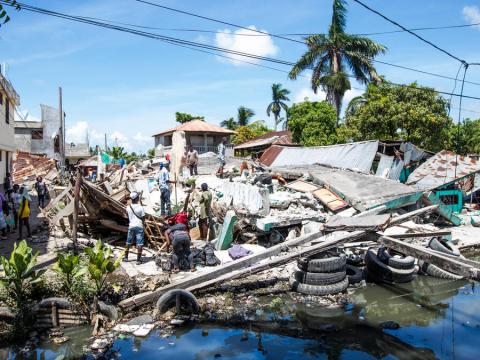Haiti: Violent earthquake complicates the precarious situation of millions of vulnerable people

The powerful 7.2-magnitude earthquake that shook Southern Haiti the morning of August 14 could complicate the precarious situation of millions of vulnerable people in the country, warned the non-governmental humanitarian organisation World Vision.
"We are deeply concerned about the devastation that this earthquake causes in a country already hit by extreme poverty, social and political unrest," said Marcelo Viscarra, National Director of World Vision in the Caribbean nation. The NGO works worldwide protecting the most vulnerable children and their families.
Eleven years ago, a powerful earthquake that killed more than 300,000 people rattled the country. "But now, along with the effects of an earthquake whose damage has not been officially assessed, we have a pandemic and the threat of Tropical Storm Grace, which is expected to hit Haitian territory on Sunday, August 15," Viscarra said.
World Vision has pre-positioned supplies to provide immediate humanitarian assistance to 6,000 people. However, the organisation will mobilise staff to the affected area (Les Cayes) 125 km south of the capital Port-au-Prince, to accurately estimate damages and the needs of the most affected families.
At least 304 people have died, with 1,800 injured and hundreds missing. There are also reports of thefts in homes affected by the earthquake. World Vision is coordinating with local civil authorities and the police in order to contribute to the protection of the most vulnerable children and their families.
"We are concerned by the limited capacity of attention of the authorities, who have their hands full with the care of the pandemic, and now the hospital centres are flooded with patients injured by the earthquake that struck at 8:30 am local time Haiti,” said Viscarra.
We ask for your prayers and your support. In Haiti more than 60% of the population lives in poverty and millions of people live on less than US$2 a day. This situation will only complicate the precarious living conditions of people trying to cope with the socio-political tension after the assassination of the President, the still ongoing effects of the devastating 2010 earthquake and the current pandemic.